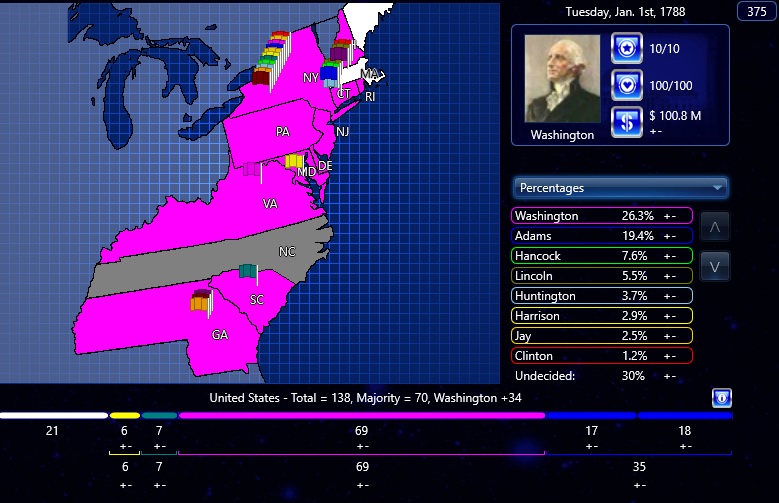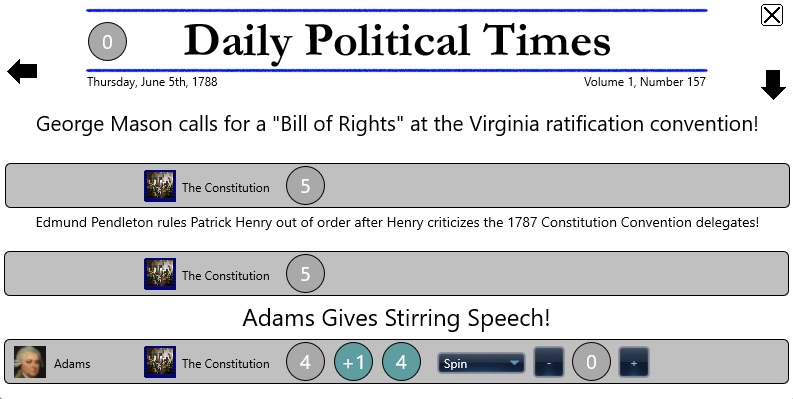US 1788 Election
*Note: This election was improved and updated by the Historical Scenario Commission on July 8, 2017 and on December 11, 2017.
Version 3.0 download here: United States – 1788 Final
Background:
The first presidential election take place amid uncertainty and chaos. Domestically, the country is struggling economically, as a result of a long war with Britain that has left the country somewhat crippled in production and trade, especially when you consider the bulk of our trade had been with Britain. The present Articles of Confederation, which binds the former colonies, has proved to be ineffective in the case of emergencies and in competing with European power.
As such, leading figures from each state had called a Convention in Philadelphia to amend the Articles of Confederation; however, the grand majority of delegates pushed for a stronger central government, resulting in a Constitution of the United States. One provision called for the election of a chief executive–the President of the United States.
As the election year of 1788 arrives, the several states are in the process of ratification, but some states are on the fence in regards to the Constitution. The more “radical” politicians, such as Patrick Henry, Samuel Adams, Thomas Jefferson, and George Clinton have been left out of the process. However, with the support of Benjamin Franklin and George Washington, and the authors of the Federalist Papers–Madison, Hamilton, and Jay–ratification seems more than likely.
In foreign affairs, a Revolution is brewing in France. While the possibility of a brother Republican is exciting, a revolution in France guarantees that trade with our new top trade partner and ally will greatly diminish, as the British are likely to block French trade.
This contest was really one for the Vice Presidency, as General George Washington, who had been president of the Constitutional Convention, was expected to win a vote from each delegate. As required from the Constitution at the time, the delegates would have a second vote to select the Vice Presidency. As Washington was a Southerner without foreign affairs experience, a pro-Constitution Northerner with foreign affairs experience was likely to become the next VP. This left John Adams, the first minister to Great Britain, as the frontrunner for this spot, since Benjamin Franklin, at 82, was too old, and John Jay was likely too young at 42. Those opposed to the Constitution turned primarily to NY Governor George Clinton.
What Really Happens?:
As expected George Washington won a vote from every elector. John Adams, who was likely to win, was able to secure victory, arguably by a larger margin than expected, as he won more votes than all the other VP-candidates combined. This is most likely because New York was too disorganized to send electors, which cut the feet from under a John Jay or George Clinton ticket. Some argue that Alexander Hamilton might have schemed to prevent Clinton, an anti-Federalist, from entering the government and destroying it from within, even at the expense of fellow NY Federalist John Jay.
Need a Suggestion as to who to play as? Try an win as these candidates:
- Why not try and disrupt the country’s attempt at federalization by joining the insurgency campaign of George Clinton?
- Why not pick John Jay and see if you can take the VP spot, even without your home state sending electors?
- Why not try and have the South lead the Early Republic by creating a Southern coalition to send John Rutledge to the vice presidency?
- Why not use John Hancock, the former president of the Continental Congress, and see if you can rest New England from fellow Massachusetts man John Adams, and take the vice presidency for yourself.
- Why not see if you can win every elector as John Adams, tying George Washington, and send the election to the House?
- Why not “watch” the election as the Simulation Party to see how the CPU plays out the election?
- Why not select one of many What-if candidates? (see below)
What if these candidates had ran?
- What if the primary Declaration author, Thomas Jefferson, a leading critic of a central government, ran for the vice presidency despite a Virginian likely to win the White House?
- What if popular general Artemas Ward ran? Is two generals too much for a presidential ticket?
- What if Samuel Adams tried to upset his cousin’s candidacy for VP?
- What if vehement critic of the Constitution, Patrick “Liberty or Death” Henry ran?
- What if Benjamin Franklin ran? While 82 years old, it is possible he could have ruined Washington’s chances at winning unanimously.
- What if James Madison, then 37, ran? Could the “Father of the Constitution” win?
- What if the “Financier of the Revolution” Robert Morris had run?
- What if William Maclay, a rabid critic of a central government, had run as another anti-Federalist?
- What if Judge James Wilson, the only Constitutional delegate to call for a popular vote, had run?
- What if Common Sense author Thomas Paine had not migrated to Europe in 1787, but stayed to take part in the Early Republic?
- What if Henry Laurens, arguably the leading trafficker in slaves, had aim to take the vice presidency by creating a Southern Bloc?
- What if Richard Henry Lee, a critic of a Constitution, had run?
- What if ambitious general Horatio Gates had joined the race?
- What if the celebrated artist, naturalist, politician Charles Willson Peale had run?
- What if the “Father of the Bill of Rights” George Mason ran despite his provincial attitude and opposition to the Constitution?
- What if the only Founding Father to sign all four major documents of the United States–Continental Association, Declaration of Independence, Articles of Confederation, and the Constitution–ran for the presidency? Could Roger Sherman win at age 67?
Feedback is desired.




Congrats on finishing!
Awesome finish to the series! Can’t wait to see the update with the new candidates and numbers. I’d love to see some later scenarios as well, but these alone have been great!
How can I add news to a campaign? Also, how can I modify the map?
@curious guy
News has to be coded its an event. I haven’t made any news or events because I don’t know how to do this. JViking made the maps for me, because I don’t know how to make the maps.
The scenario is not working properly with update 2.0.9. You cannot turn off any candidates without a message saying you need at least two candidates running before starting the scenario. (even with two presidential and vice presidential candidates running)
It’s something with all of 2.0.9. Not just this one campaign.
@Nick
Yeah, I eventually figured that out. 😉
Hey, I was wondering are you gonna do 1960, ’64, ’72, ’76, ’80, ’84, ’88, ’92, ’96, 2000 and 2004?
I will after I do the grand updates 1788 to 1956. It appears I’m doing the updates alone, so it may be until February until I get to them.
After playing through this scenario as John Jay trying to become VP, Thomas Jefferson with Franklin in to try to become President or VP, and as Franklin trying to beat Washington, I thin this scenario is one of the best but could be even better if John Adams, Jefferson, Samuel Adams, John Hancock, James Madison, and Patrick Henry were also added as what-ifs for the Presidential race if Washington did not run, as they would have been the leading candidates. Also, if Washington sat out the race, other notable elder statesmen could be added as off candidates such as William Livingston, Philip John Schuyler, and Henry Laurens. Nathanael Greene could be added as a what-if candidate if he lived and Washington didn’t run to be the military leader to unite the country.
Very good ideas. I’ll think about the best options for this. On the whole, you don’t have any real candidates for president (unifying figure) than those that I have. Everyone else, including the Adams brothers and Jefferson are distinctly regional at this point. Franklin is internationally known, which makes him recognizable to all the other states , too. Washington was really the only choice. Yeah, it would be cool to see what would happen with no real national candidates. Thanks
Thomas Paine could also be a long shot what-if candidate for President both with and without Washington. Common Sense made him well known and popular, but he also had experience in government through his work securing loans to fund the revolution and early government. Horatio Gates could be another what-if without Washington as he was another prominent military man despite his less than stellar reputation, but would have broad support perhaps without another consensus candidate.
Thomas Paine might not qualify. He was barely in America. He arrived shortly before the revolution from Great Britain and soon went to France. I’ll try to get the exact dates, but it may have been less than 10 years.
Those are good suggestions. The more the better. 😀
If Alexander Hamilton qualified then I’d say Paine did as well. He was a British citizen in America prior to the Revolution, as was technically everyone who’d been born in the colonies, and was a U.S citizen afterwards. He served in the Revolution, though not the way Hamilton did. I think that these circumstances create an eligibility for both of them that, while not applicable today, worked with the original formation of the country and the Comstitution.
I’d have to check the citizen requirements for his state. Hamilton was considered a citizen of NY, which clearly makes him a citizen of the US at that time. Paine lived briefly in the US as a full-timer. He was living in London and France virtually full time by 1787, which takes him out of the running. I probably won’t add him for that reason and because I don’t think Common Sense and his work as an aide for Nathaniel Greene would encourage the electors to vote for him as a considerable candidate. He ended up buying property in NJ, but he also lived in NY and PA. So his residency is in question, too.
After thinking about it further and doing some research, he was an official resident of Pennsylvania, but the question for him (and not Hamilton) is whether or not he was a resident at the founding of the constitution. If he is, then he can run for president. He leaves the year of the constitution. If he moves to London before the constitution was passed in 1788 (Paine was in Europe in 1787). Is he still a resident?
I’ve decided I will add Paine, because it would be interesting to have in there. I’m keeping Adams and Jefferson on ticket #2. To balance out ticket #1, I’m going to add a few more token people, who would have had a larger national reputation than even Adams and Jefferson, who were still more regional at this point.
The following had national range, political ambition and an international reputation
– Thomas Paine, author of Common Sense
– Noah Webster, famous for his Dictionary, but was also the editor of the leading Federalist paper. He had a great reputation.
– Horatio Gates, #2 general after Washington
– Charles Willson Peale, scientist, artist, politicians, naturalist
– George Mason, mostly regional, but he is the kind of person to try and hold Virginia from everyone else. He was one of the most vocal anti-Federalists
– Roger Sherman, the only man to sign all 4 major early American documents.
It should be noted that none of these will have the support of Washington or Franklin. If Washington is turned OFF, then it is possible for a ticket 2 person to win the presidency; however, Franklin would be the frontrunner.
Update. Replaced Noah Webster with Henry Laurens. Webster was too young.
I simulated two games with Washington OFF. The first with everyone else, including Franklin on led to a Franklin/J. Adams ticket. The second with Franklin and Washington OFF, but everyone else on, led to a Roger Sherman/George Mason ticket (both men on the first ballot).